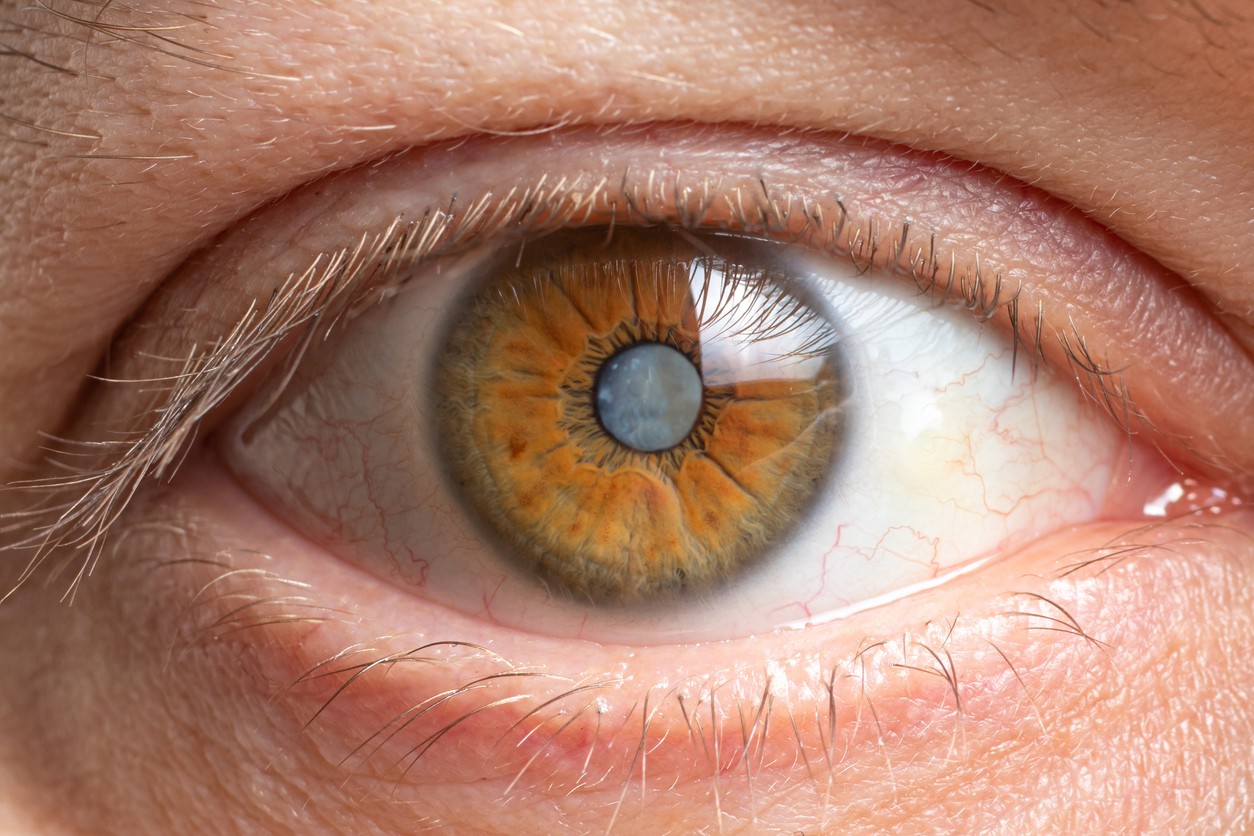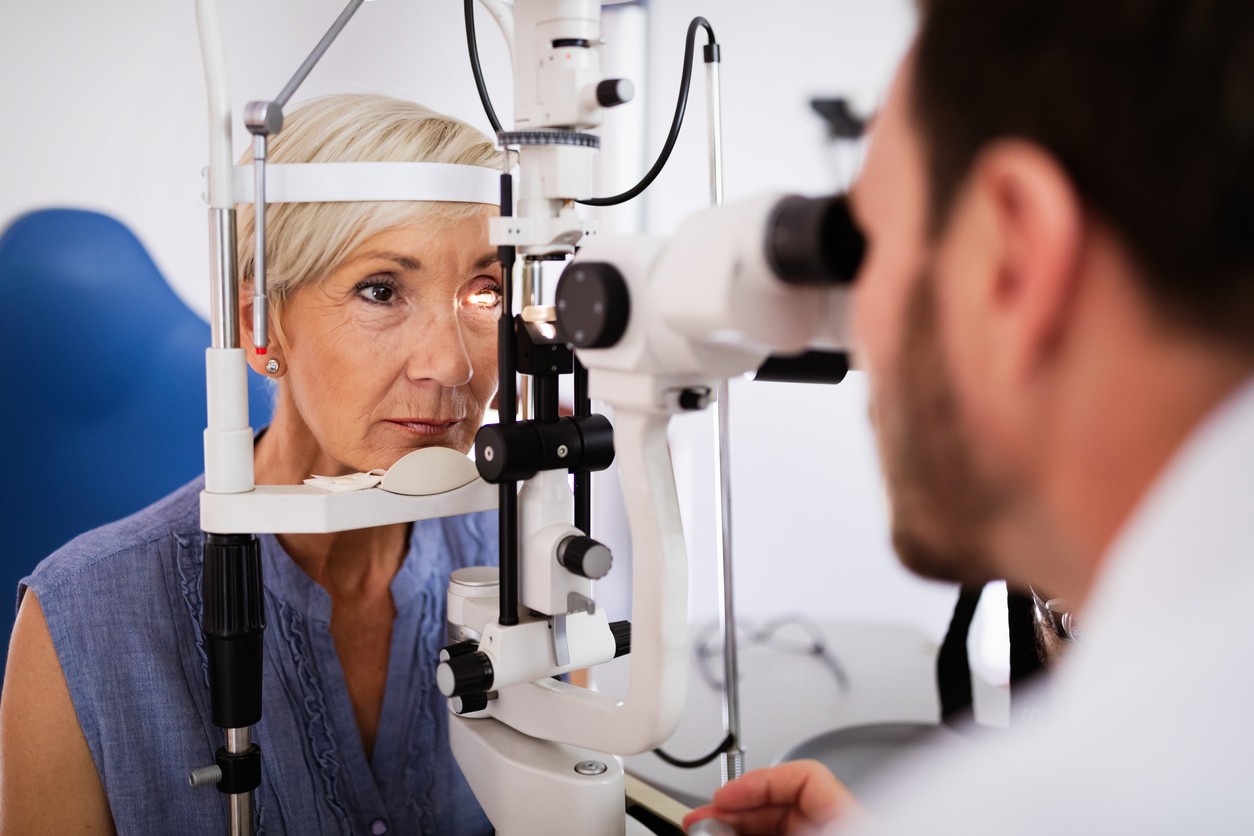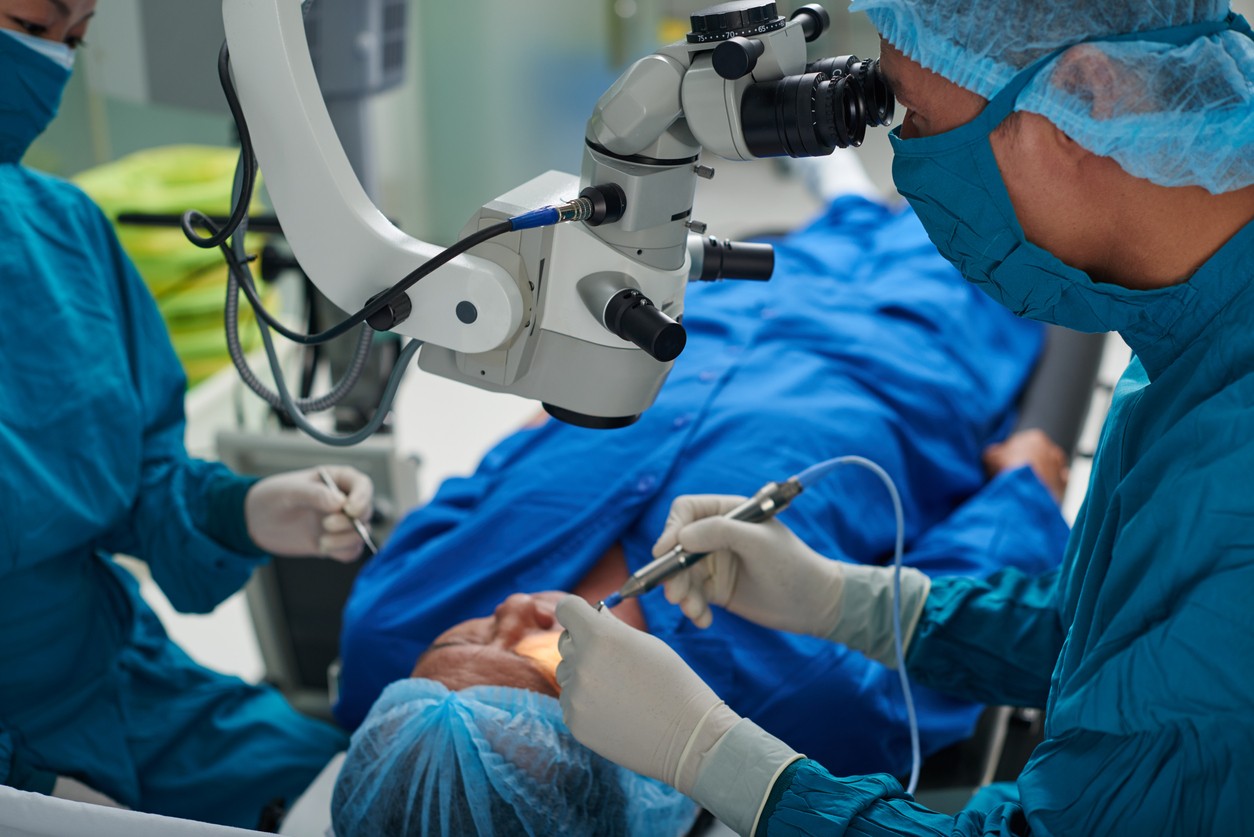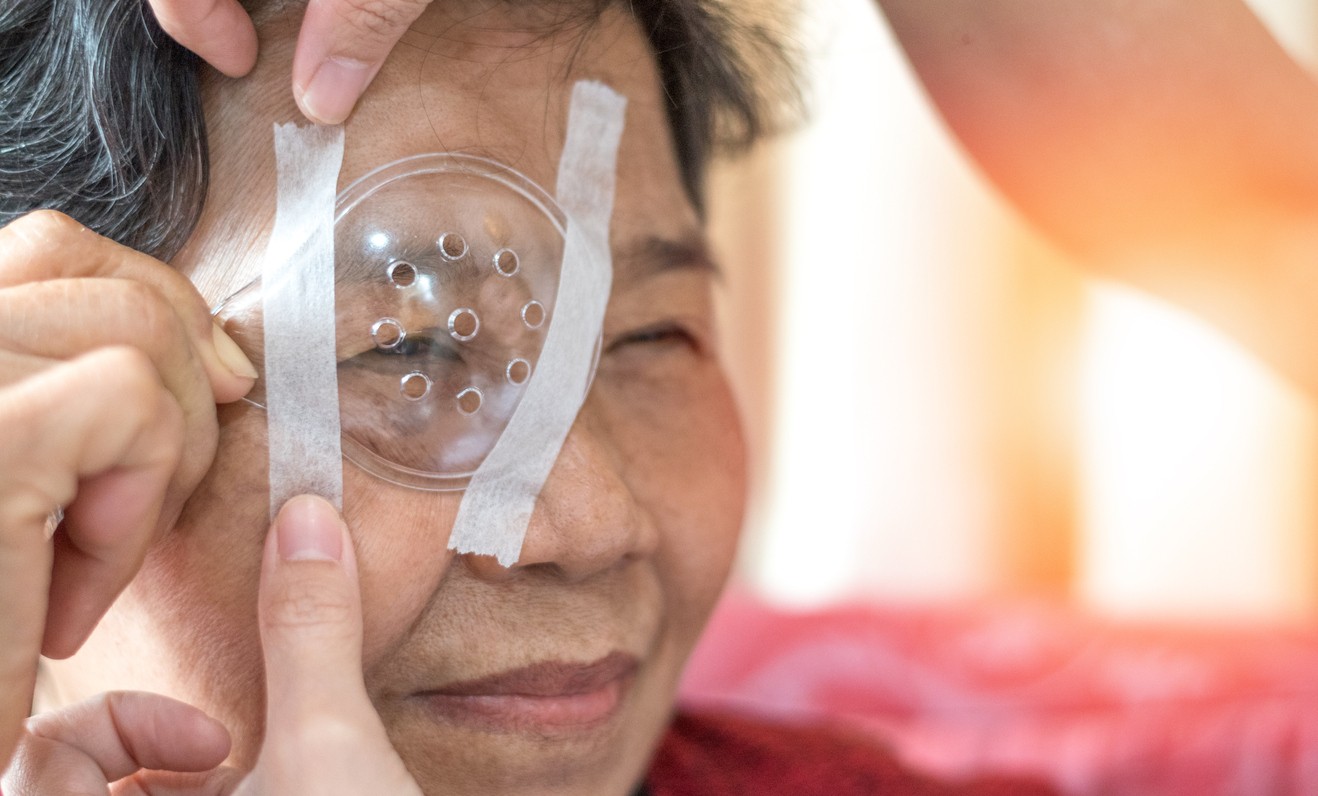What to Expect with Cataract Surgery: Before, During and After

It can be difficult to struggle with vision problems, especially those that appear as you age. At ICON Eyecare, we recognize that suffering from cataracts and the thought of cataract surgery can both be intimidating and frightening. Our caring team is here to help you, or a parent or loved one, understand the complete process from consultation to your final post-operative appointment. We hope this comprehensive guide can make you feel more comfortable with our cataract procedure. If you have any further questions, don’t hesitate to contact our team.
What Is a Cataract?

If you notice any vision changes, our expert eye doctors will perform thorough eye exams, diagnose vision problems, and determine a correct course of treatment. Cataracts, or cloudy patches in your eye’s natural lens, may affect your vision. Even if you wear glasses or contact lenses, you may notice:
- Cloudy or blurry vision
- Faded colors
- Difficulty seeing fine details
- Poor night vision
- Sensitivity to bright light
- Need for more light to see properly
- Halos or glares
- Double vision
These symptoms may worsen over time, although the severity of vision problems can increase gradually. Most people who have cataracts only start to develop noticeable vision changes past their 50th birthday. However, an eye care specialist needs to evaluate and diagnose your cataracts if you notice any of these symptoms. Since cataracts are progressive, they have the power to impact your health and your quality of life in significant ways. They are the leading cause of vision loss in the United States and blindness worldwide.
Scheduling a Consultation

At ICON Eyecare, we know scheduling a consultation can be the most challenging part of the process. Our kind and caring eye care team makes taking that first step as easy as possible. Simply give us a phone call to set up a consultation for yourself or a loved one.
At your first appointment, a knowledgeable and experienced eye doctor will begin by discussing your eye and vision concerns and symptoms. We will consider your health and medication history, and current health concerns.
Next, we will perform a series of eye tests to:
- Determine if you have vision problems
- Detect eye abnormalities and other disorders
- Establish if you have a cataract and where it is
- Evaluate the severity of your cataract
- Measure the pressure in your eye
Finally, we will ascertain the best course of treatment for your cataracts. Like most people who have cataracts, you may be eligible for cataract surgery. Cataract surgery is an advanced procedure where your eye surgeon removes the cloudy lens and replaces it with a clear, artificial lens. You may be a great candidate for the surgery if:
- Your cataracts affect your daily activities
- You experience many symptoms impacting your vision
- You want to have a clearer vision
You may not be a good candidate for cataract surgery if you have extreme macular degeneration or other retinal issues. It may be best to treat these problems before cataract surgery. If you have diabetic retinopathy, cataract surgery can potentially worsen the condition.
If you are eligible for cataract surgery, we will explain the options for surgery and lenses. In most cases, you will be able to meet with our team on the day of your consultation to set a date for surgery.
Types of Cataract Surgery

ICON Eyecare doctors in Grand Junction will make sure you feel comfortable, safe, and empowered when you opt for cataract surgery. We will discuss your cataract surgery options with you to ensure we select a treatment that matches your specific needs. Cataract surgery is usually done using a technique called phacoemulsification.
Phacoemulsification involves the eye surgeon making a tiny incision with a blade, breaking up the affected lens with ultrasound waves, and removing the lens via suction. After this process, they will carefully implant the intraocular lens or IOL.
Choosing an Artificial Lens
During your consultation, our eye doctors will also outline your options for artificial lenses. Intraocular lenses (IOLs) mimic healthy, clear natural lenses. Since everyone is unique, choosing an intraocular lens that matches your lifestyle is crucial.
Types of Lenses
At our eye care and treatment center, we offer several different types of IOLs:
- Monofocal: Monofocal lenses help individuals see and focus at a specific, predetermined distance (near or far). Most patients opt for the distance they have the most trouble with or the one they would use the most often. You can wear eyeglasses or contact lenses with monofocals.
- Toric: Toric lenses improve a specific distance vision as well. Yet, they also have an additional perk. They correct astigmatism which can reduce dependence on glasses or contact lenses.
- Multifocal lenses: These lenses are suitable for individuals who would like to improve vision and focus for all three distances – close, medium, and far.
During your consultation, we will discuss your options for lenses and answer any questions you may have.
Before Surgery
When you and your doctor determine cataract surgery is the best treatment option, you are well on your way to clear vision. We will arrange a pre-operative appointment (typically the same day) to make sure you are ready, informed, and confident in your treatment choice.
Your doctor will provide you with a list of things to do to prepare for your surgery. You must keep your list and follow the instructions. They may include:
- Arranging a ride to and from ICON Eyecare for your cataract surgery
- Sticking to light exercise
- Quitting smoking or maintaining a smoke-free lifestyle
- Refraining from drinking alcohol
- Avoiding stressful activity
During Surgery
On the day of your surgery, you should have a loved one or a trusted individual drive you to your appointment and drive you home from your appointment. It is essential to wear comfortable clothing, avoid perfume and other scented products, and avoid makeup and false eyelashes.
Once you arrive at your appointment, our ICON eyecare will ensure you feel well and assured. You will be in good hands, as one of our qualified and experienced eye surgeons will take the lead on your cataract procedure. Our cataract doctors include Dr. James Fox, Dr. Carl Tubbs, and Dr. Scott Czarnecki. They can perform your outpatient procedure quickly and safely. In general, you can expect the process to take 20 minutes.
At the beginning of your cataract surgery, your eye doctor will place eye drops in your eye to dilate your pupil. They will also give you local anesthesia to numb the eye. You will also be given an IV to allow for additional sedation to make your experience as pleasant as possible.
Next, the surgeon will start by making a small incision on the side of your eye. In this way, they can access your natural lens.
When the doctor accesses your natural lens, they will begin breaking down the clouded lens. They can do this with an ultrasonic device. Then, they will take out the deconstructed lens with a suction tool. In this way, they perform cataract removal.
They will insert the new IOL and ensure it is in the right place. They may use a special intraoperative wavefront aberrometer device before or after placement of the IOL to check how your eye directs light. They will adjust the IOL to suit your vision needs at this point.
Since your surgery only uses precise cuts, you do not require stitches to heal in either type of cataract surgery. You will also receive antibacterial and anti-inflammatory eye drops.
After Surgery

After your cataract surgeon completes your surgery, you will be moved into our post-op area. You will need to stay in our center for 30 minutes to one hour to make sure you’re feeling well enough to go home. It is also best to wait because the local anesthesia and any relaxing medication need to wear off.
You should not experience any significant pain. However, you may experience a few symptoms post-surgery. There is no need to worry if you experience any of the following in the first few days of the recovery period:
- Temporary light sensitivity
- Blurred vision
- Grogginess
- Fatigue
- Bloodshot eyes
- Dry, scratchy eyes
- Watery eyes
Follow-Up Appointments
Typically, you will have several follow-up appointments within the first few days and weeks. At these appointments, your doctor will evaluate your eye and make sure the healing progresses well. You can feel free to ask any questions or present any concerns during this time. Although complete healing can take up to four months, most patients make their full cataract surgery recovery in only a month. You may see vision improvement a few days after surgery and significant benefits after a month.
Your eye doctor will provide you with a detailed list of instructions for post-surgery care. However, in general, we promote the following guidelines:
- Do: Wear your sunglasses when you go outdoors to protect your eyes
- Do: Come for any follow-up appointments scheduled to review eyeglasses, contact lenses prescriptions, or evaluation to see how healing and vision progress.
- Do: Return to normal activities if they are light and non-strenuous
- Do Not: Lift objects weighing more than 15 pounds for one week from surgery
- Do Not: Bend over for one week from surgery
- Do Not: Wear makeup on your eyes or around your eyes for 1 week
- Do Not: Rub your eye even if it is itchy for 1 week
- Do Not: Submerge your face in the water or come in contact with direct water pressure for two weeks
- Do Not: Perform strenuous activity for 1 week
When to Call Your Eye Doctor

In some cases, a cataract patient may experience severe symptoms. Call us if you notice:
- Eye pain
- Vision loss
- Worsening eyesight
- Worsening redness
- Swelling
- Discharge
- Flashes of light or bursts of floaters in your eye
- Cloudy or blurred vision at any point after your surgery, even years down the line. You may have a secondary cataract. Our surgeons can repair this issue quickly using YAG laser capsulotomy.
- You want to schedule your second cataract surgery in your other eye after you make a full recovery.
Find a Cataract Surgeon in Grand Junction, CO
Are you concerned about your cataracts or a parent or loved one’s vision? Discuss cataract surgery with a knowledgeable and experienced cataract surgeon. Contact our ICON Eyecare team today!
[DISPLAY_ULTIMATE_SOCIAL_ICONS]








